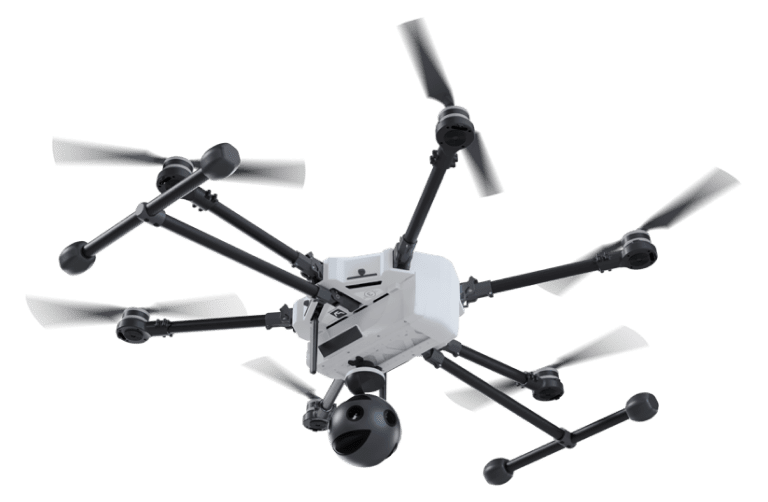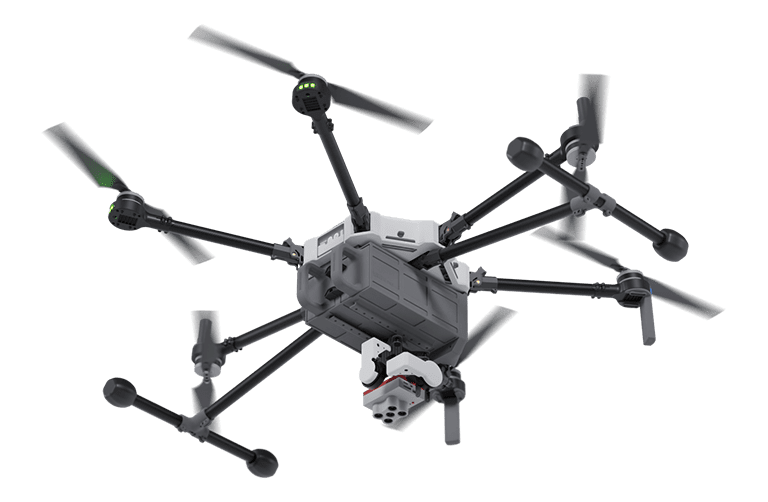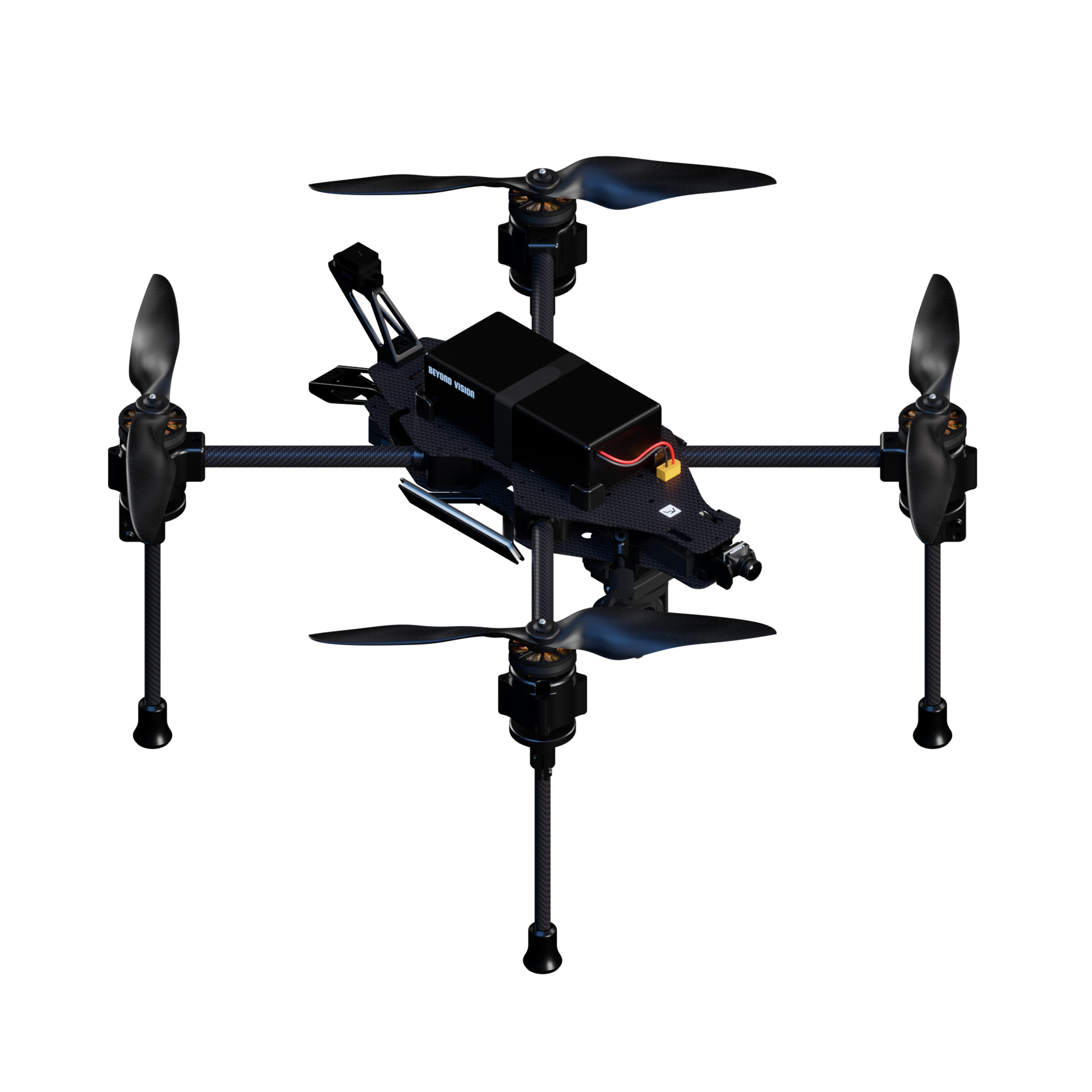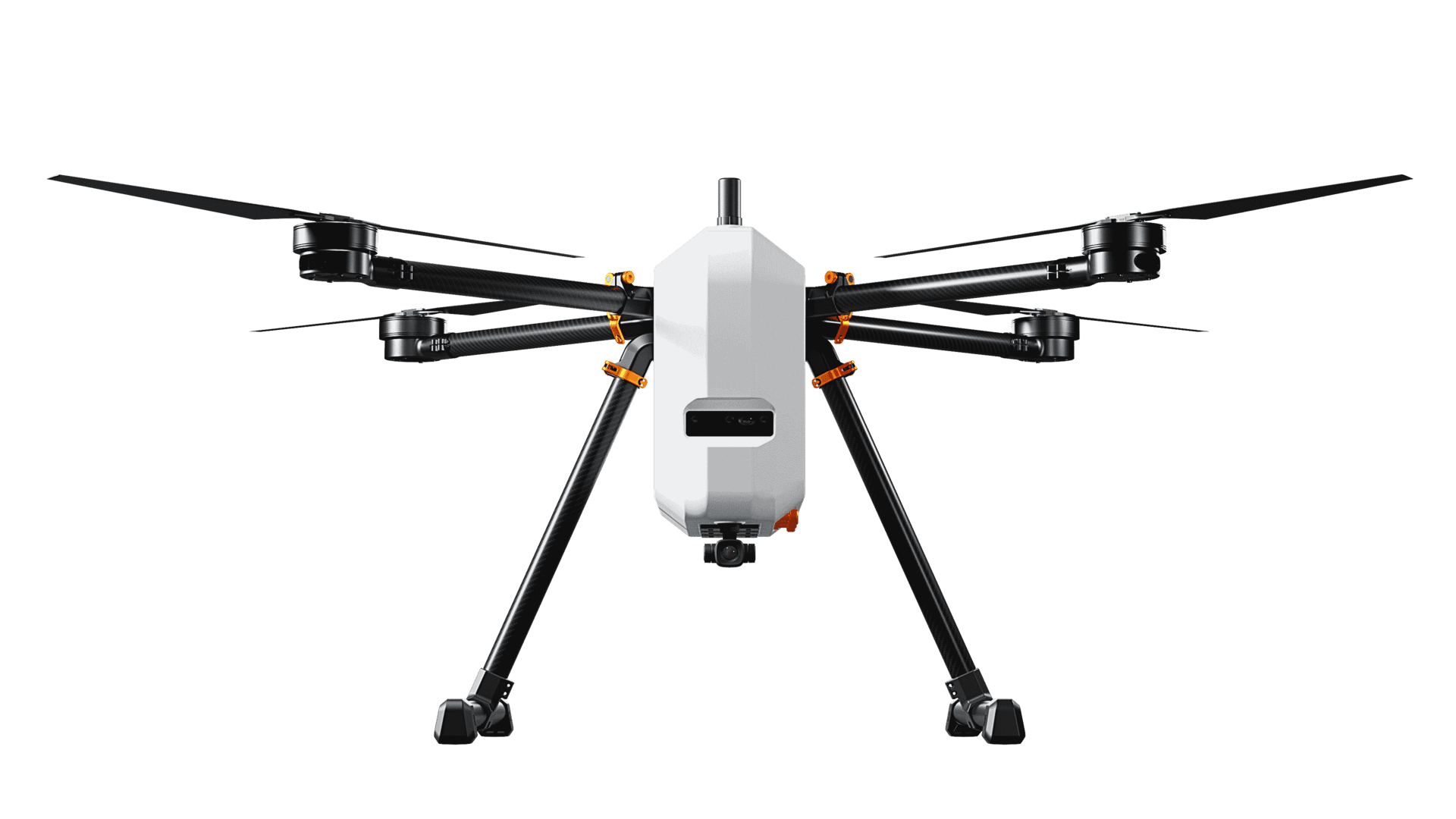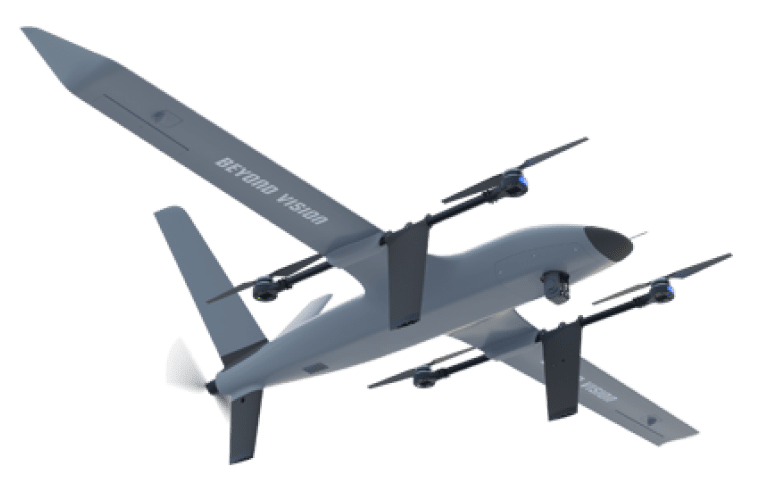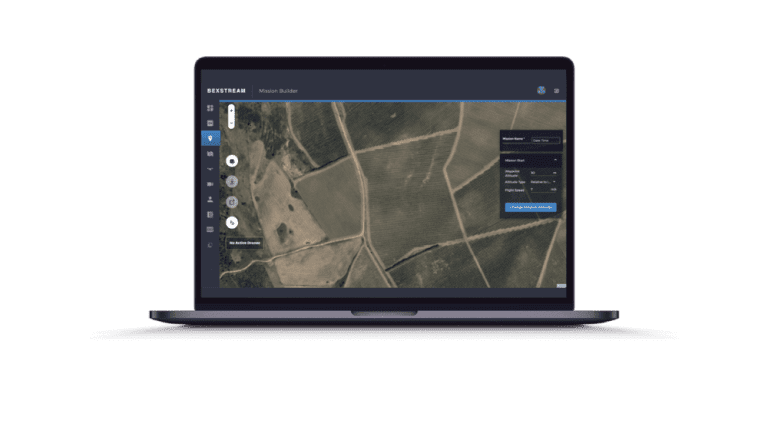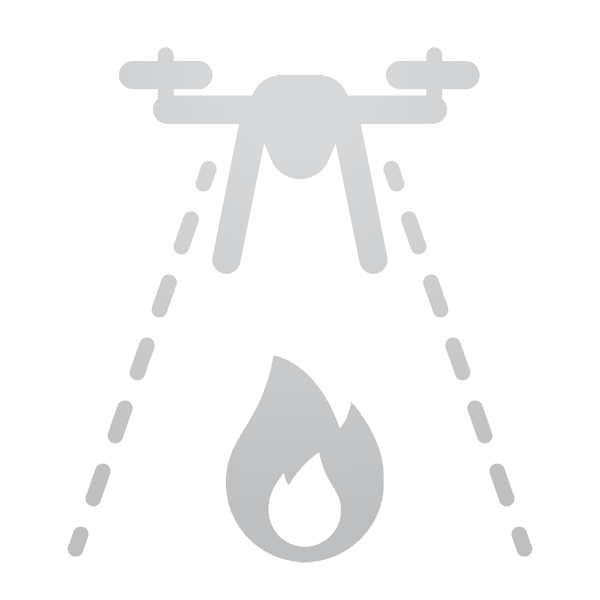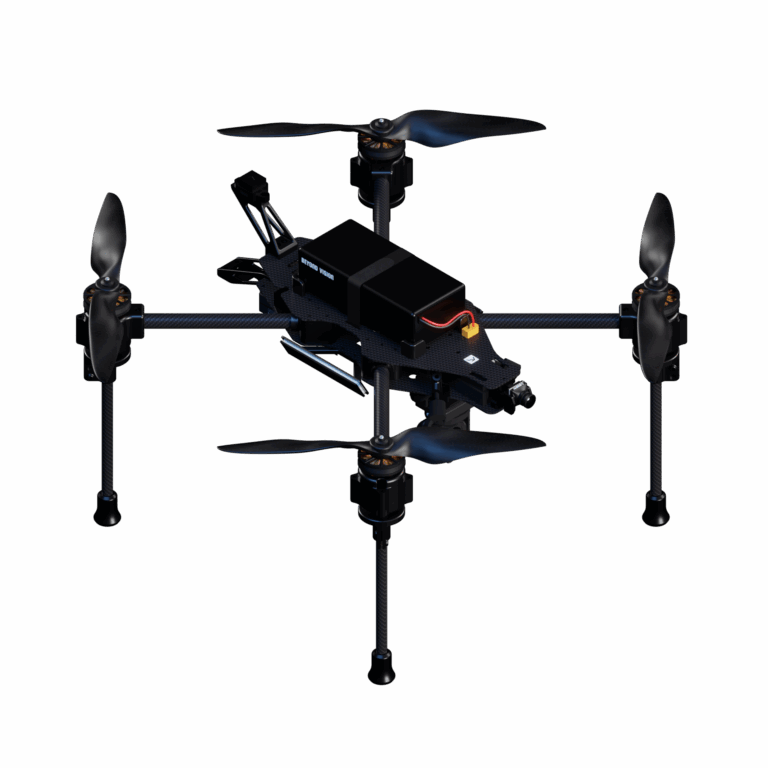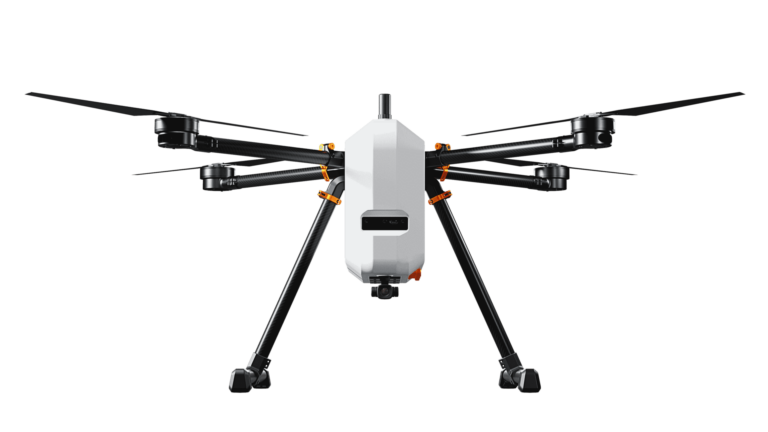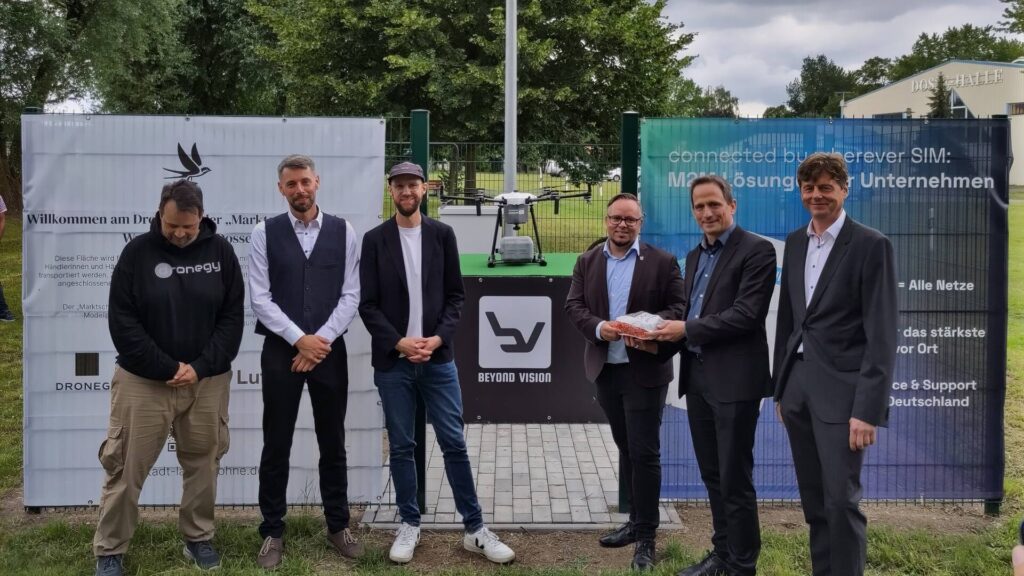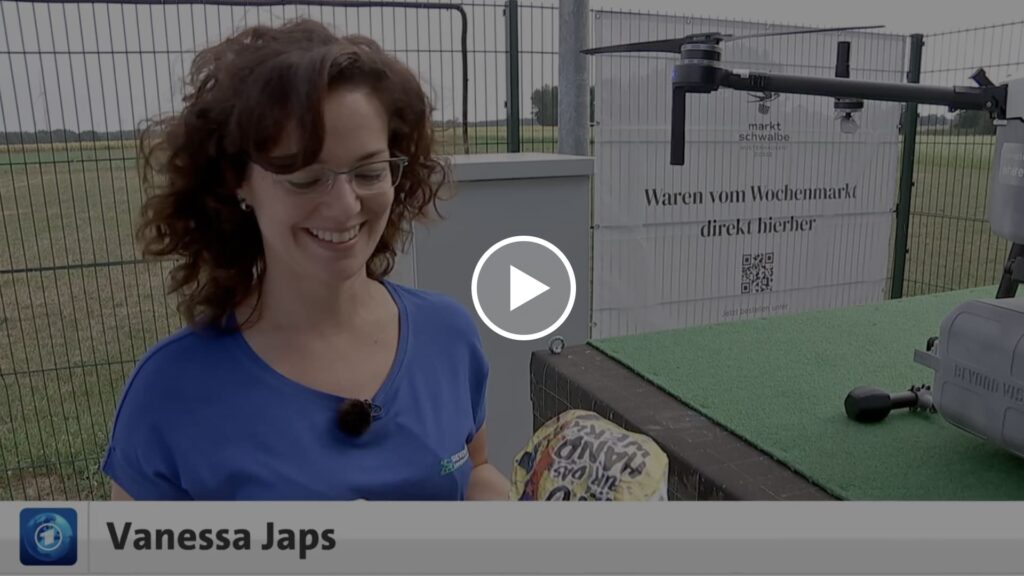Beyond Vision est à l'origine d'améliorations significatives de l'accès aux biens essentiels et de la logistique rurale. Avec le lancement du projet Marktschwalbe dans le Brandebourg, dans la ville de Wusterhausen/Dosse, la société introduit un système innovant basé sur les drones pour combler le fossé entre les communautés rurales éloignées et les centres urbains.
Concrètement, cela signifie que les habitants des zones reculées se verront livrer directement des produits de première nécessité, tels que des denrées alimentaires et des articles ménagers, ce qui leur évitera de devoir parcourir de longues distances. Soutenue par le ministère fédéral de l'alimentation et de l'agriculture et développée avec Luftlabor et Dronegy, l'utilisation de drones rationalise le processus de livraison, minimisant le temps et les efforts nécessaires pour atteindre ces endroits mal desservis.
Concrètement, cela signifie que les habitants des zones reculées se verront livrer directement des produits de première nécessité, tels que des denrées alimentaires et des articles ménagers, ce qui leur évitera de devoir parcourir de longues distances. Soutenue par le ministère fédéral de l'alimentation et de l'agriculture et développée avec Luftlabor et Dronegy, l'utilisation de drones rationalise le processus de livraison, minimisant le temps et les efforts nécessaires pour atteindre ces endroits mal desservis.
Défi 1 : Accès limité aux biens essentiels dans les zones rurales
Les communautés rurales sont confrontées à d'importantes difficultés d'accès aux biens et services de base. Au cours des dernières décennies, le nombre de petites entreprises locales a diminué en Allemagne, ce qui a entraîné une pénurie d'options d'achat pratiques dans les zones rurales. Cette situation a été particulièrement préjudiciable pour des régions comme Wusterhausen/Dosse, où les populations sont clairsemées et où l'infrastructure de distribution régulière des marchandises fait défaut. Sans accès facile aux marchés locaux, les habitants sont contraints de parcourir de longues distances pour satisfaire leurs besoins quotidiens, ce qui peut s'avérer coûteux et prendre du temps.
La solution : Système de livraison par drone
Pour répondre à ce défi croissant, Beyond Vision, en collaboration avec ses partenaires, a mis au point un système de livraison par drone. Le projet Marktschwalbe vise à relier les villages isolés aux centres urbains en utilisant des drones perfectionnés pour livrer des produits de première nécessité à partir des marchés voisins. Cette solution se concentre principalement sur trois districts - Barsikow, Trieplatz et Blankenberg - où les populations sont peu nombreuses et l'accès aux services limité. Grâce à ce projet, Beyond Vision garantit un accès régulier et fiable aux marchandises, ce qui améliore considérablement la qualité de vie des habitants des zones rurales.
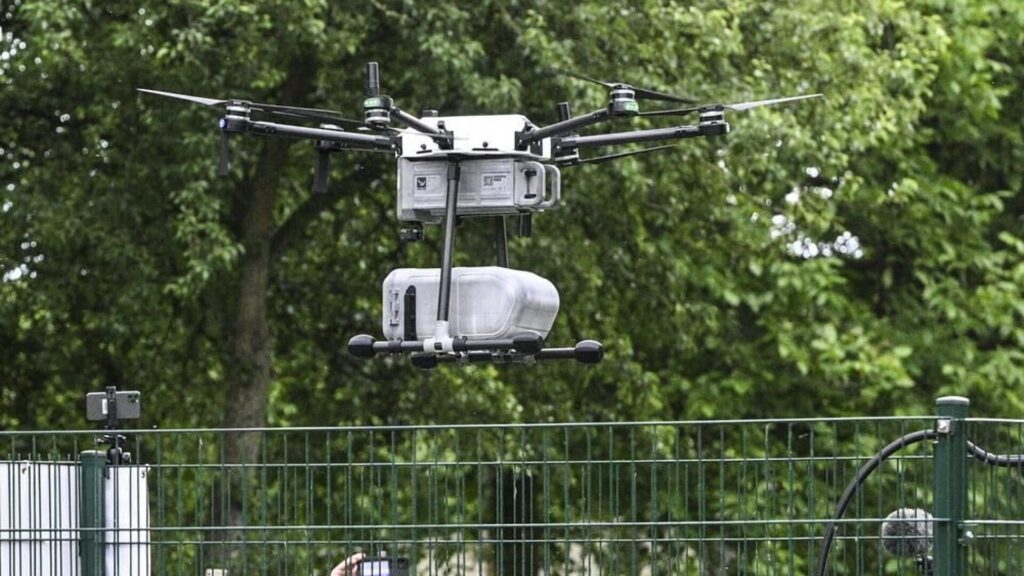
Défi 2 : Logistique rurale inefficace
La logistique rurale dans des régions comme Wusterhausen/Dosse souffre souvent d'inefficacité en raison du terrain difficile et de l'absence d'infrastructures optimisées. Les méthodes de livraison traditionnelles ne sont pas adaptées pour atteindre les zones reculées rapidement et de manière rentable, ce qui fait que les habitants des zones rurales sont coupés des produits de première nécessité. La difficulté de traverser ces régions avec des solutions de transport conventionnelles exacerbe ce problème, créant un besoin pressant d'un système logistique alternatif.
La solution : La technologie avancée des drones
Le projet Marktschwalbe s'appuie sur les drones hexacoptères de Beyond Vision, conçus pour relever efficacement les défis de la logistique rurale. Pouvant transporter jusqu'à 3 kg de marchandises dans un rayon de 12 kilomètres, ces drones se sont révélés idéaux pour livrer de la nourriture et d'autres produits de première nécessité aux communautés isolées. Un Droneport centralisé à Wusterhausen/Dosse sert de plaque tournante pour la réception, le traitement et l'expédition des commandes.
En outre, les drones sont intégrés à un réseau 5G, ce qui permet une communication en temps réel et un contrôle opérationnel précis. Cela garantit que les livraisons sont effectuées avec précision et efficacité, en minimisant les erreurs et en maximisant la fiabilité du service. L'utilisation innovante des drones établit également une nouvelle norme pour la logistique rurale, permettant des livraisons rapides et fiables dans des régions qui ont longtemps été mal desservies.
En outre, les drones sont intégrés à un réseau 5G, ce qui permet une communication en temps réel et un contrôle opérationnel précis. Cela garantit que les livraisons sont effectuées avec précision et efficacité, en minimisant les erreurs et en maximisant la fiabilité du service. L'utilisation innovante des drones établit également une nouvelle norme pour la logistique rurale, permettant des livraisons rapides et fiables dans des régions qui ont longtemps été mal desservies.
Défi 3 : Manque d'implication de la communauté dans les initiatives technologiques
L'un des défis les plus courants dans la mise en œuvre de nouvelles technologies dans les zones rurales est de gagner la confiance et la participation de la communauté. De nombreux projets technologiques échouent parce qu'ils ne tiennent pas compte des préoccupations et des préférences de la communauté locale. Sans une collaboration adéquate avec les autorités locales et les habitants, les innovations technologiques risquent de se heurter à des résistances ou de ne pas répondre aux besoins réels de la population.
La solution : La technologie avancée des drones
Dès le départ, le projet Marktschwalbe a mis l'accent sur une collaboration étroite avec les autorités locales et les citoyens. Beyond Vision et son partenaire Luftlabor se sont activement engagés auprès de la communauté, veillant à ce que le projet s'aligne sur les besoins et les préférences locales. Cette approche coopérative a favorisé un environnement de confiance, ce qui a été crucial pour la réussite du projet.
La première livraison par drone en juin 2024 était très attendue par la communauté locale et a eu un impact significatif sur la logistique rurale. La collaboration continue avec les parties prenantes locales sera essentielle au fur et à mesure que le projet évoluera, afin de s'assurer qu'il reste attentif aux besoins et aux préoccupations de la communauté.
La première livraison par drone en juin 2024 était très attendue par la communauté locale et a eu un impact significatif sur la logistique rurale. La collaboration continue avec les parties prenantes locales sera essentielle au fur et à mesure que le projet évoluera, afin de s'assurer qu'il reste attentif aux besoins et aux préoccupations de la communauté.
Défi 4 : Obstacles économiques à l'accessibilité des services
Les zones rurales connaissent souvent des taux de pauvreté plus élevés, ce qui peut limiter la capacité des habitants à accéder à de nouveaux services, en particulier ceux qui font appel à des technologies avancées. Veiller à ce que ces services soient abordables et équitables est un défi de taille lorsqu'il s'agit de déployer de nouvelles technologies dans des régions économiquement défavorisées.
La solution : Des services inclusifs et abordables
Beyond Vision a pris des mesures pour s'assurer que le service de livraison par drone est accessible à tous, quel que soit le niveau de revenu. Un système de tarification équitable a été mis en place pour que les résidents de tous les milieux économiques puissent bénéficier de ce service innovant. En s'attaquant à la question de l'accessibilité financière, Beyond Vision a créé une solution qui n'est pas seulement technologiquement avancée, mais aussi socialement inclusive.
Défi 5 : Impact environnemental de la logistique rurale
Les systèmes logistiques traditionnels contribuent à la dégradation de l'environnement, en particulier dans les zones rurales où des transports sur de longues distances sont souvent nécessaires pour accéder aux biens et aux services. Ces méthodes de transport augmentent les émissions de carbone et pèsent sur les ressources naturelles et l'environnement, d'où la nécessité de passer à des modèles de livraison plus durables.
La solution : La technologie durable des drones
Le projet Marktschwalbe est une étape vers des solutions logistiques plus durables. L'utilisation de drones pour les livraisons permet de réduire le besoin de véhicules qui contribuent aux émissions de carbone en raison de leurs déplacements sur de longues distances. Les drones, alimentés par l'énergie électrique, offrent une alternative plus verte, contribuant à préserver l'environnement tout en maintenant une chaîne d'approvisionnement fiable pour les communautés rurales.
Regardez les informations relatives au projet sur la chaîne allemande ARD Mediathek
Défi 6 : Extensibilité limitée et expansion future
De nombreuses solutions technologiques ont une portée limitée, ne desservant que de petites régions ou des communautés spécifiques, sans possibilité d'extension. Pour que des initiatives telles que le projet Marktschwalbe aient un impact durable, elles doivent pouvoir s'étendre au-delà de leurs zones de déploiement initiales et s'adapter aux nouveaux défis qui se présentent.
La solution : Une vision pour l'expansion future
Beyond Vision considère le projet Marktschwalbe comme un modèle d'expansion future. L'expérience acquise lors de la mise en œuvre de ce système de livraison par drone à Wusterhausen/Dosse guidera les projets futurs, tant en Allemagne qu'à l'échelle mondiale. En affinant continuellement sa technologie et ses opérations, l'entreprise vise à étendre la portée de ses services à d'autres zones rurales confrontées à des défis logistiques similaires. Le projet a déjà attiré l'attention de diverses organisations intéressées par l'adoption de la technologie des drones pour révolutionner la logistique rurale dans d'autres régions.
Conclusion : Une nouvelle ère de connectivité rurale
Le projet Marktschwalbe marque un nouveau chapitre dans la connectivité rurale, en offrant une solution transformatrice aux défis de la logistique dans les zones reculées. L'utilisation d'une technologie de pointe en matière de drones, associée à un souci de durabilité, d'implication des communautés et d'équité, permet au projet de se démarquer et ouvre la voie à un avenir meilleur pour les communautés rurales d'Allemagne et d'ailleurs.
Résumé
Le projet Marktschwalbe, auquel participe Beyond Vision en collaboration avec Luftlabor et Dronegy, vise à résoudre les problèmes de connectivité rurale et de logistique dans la ville de Wusterhausen/Dosse, dans le Brandebourg. Soutenue par le ministère fédéral allemand de l'alimentation et de l'agriculture, l'initiative utilise la technologie des drones pour livrer des produits de première nécessité, tels que des denrées alimentaires et des articles ménagers, à des communautés isolées, améliorant ainsi considérablement l'accès des habitants des zones rurales.
Le projet s'attaque à plusieurs défis : l'accès limité aux marchandises, la logistique inefficace, l'engagement des communautés, les obstacles économiques, la durabilité environnementale et l'évolutivité.
Des drones hexacoptères avancés, connectés par un réseau 5G, transportent des fournitures dans des zones reculées, offrant une alternative fiable et écologique aux méthodes de livraison traditionnelles. L'implication de la communauté et le prix abordable garantissent une acceptation et une accessibilité étendues, tandis que la durabilité est assurée par des drones fonctionnant à l'électricité, ce qui réduit les émissions de carbone. Le succès de Marktschwalbe à Wusterhausen/Dosse ouvre la voie à une expansion future, susceptible de transformer la logistique rurale en Allemagne et dans le monde.
Des drones hexacoptères avancés, connectés par un réseau 5G, transportent des fournitures dans des zones reculées, offrant une alternative fiable et écologique aux méthodes de livraison traditionnelles. L'implication de la communauté et le prix abordable garantissent une acceptation et une accessibilité étendues, tandis que la durabilité est assurée par des drones fonctionnant à l'électricité, ce qui réduit les émissions de carbone. Le succès de Marktschwalbe à Wusterhausen/Dosse ouvre la voie à une expansion future, susceptible de transformer la logistique rurale en Allemagne et dans le monde.
Vous vous demandez ce que Beyond Vision peut faire pour vous ?
Questions liées
Qu'est-ce que le projet Marktschwalbe ?
Le projet Marktschwalbe est une initiative lancée à Wusterhausen/Dosse, dans le Brandebourg, pour améliorer l'accès aux produits de première nécessité dans les zones rurales grâce à un système de livraison par drone. Ce projet vise à relier les communautés isolées aux marchés voisins, réduisant ainsi la nécessité de parcourir de longues distances pour se procurer les produits nécessaires.
Comment fonctionne le système de livraison par drone ?
Les habitants des régions isolées peuvent commander des produits tels que de la nourriture ou des articles ménagers via une plateforme internet ou un téléphone. Un répartiteur recueille ces commandes et les transporte jusqu'à un Droneport, où elles sont chargées dans des drones. Les drones livrent ensuite les articles à des points d'atterrissage centraux dans les villages, d'où les habitants peuvent récupérer leurs livraisons.
Quels défis le projet Marktschwalbe relève-t-il ?
Le projet relève plusieurs défis :
- Accès limité aux produits de première nécessité : Il apporte une solution à la rareté des possibilités d'achats locaux.
- Une logistique rurale inefficace : Elle permet de surmonter les problèmes liés aux terrains difficiles et aux infrastructures inadéquates.
- Le manque d'implication de la communauté : Il garantit la participation et la collaboration locales afin d'aligner le service sur les besoins de la communauté.
- Obstacles économiques : Il propose un système de tarification équitable pour rendre le service accessible à tous les niveaux de revenus.
- L'impact sur l'environnement : Il réduit les émissions de carbone par rapport aux méthodes de livraison traditionnelles.
- L'extensibilité : Il vise à créer un modèle qui peut être étendu à d'autres régions.
Quelle technologie est utilisée dans le projet ?
Le projet utilise des drones hexacoptères équipés de la technologie 5G pour une communication en temps réel et un contrôle précis. Ces drones peuvent transporter jusqu'à 3 kg de marchandises dans un rayon de 12 kilomètres et fonctionnent à partir d'un Droneport central à Wusterhausen/Dosse.
Comment le projet implique-t-il la communauté ?
Dès le début, le projet s'est engagé activement avec les autorités locales et les résidents pour s'assurer qu'il répondait à leurs besoins et à leurs préférences. Cette collaboration a favorisé la confiance et le soutien à l'initiative.
Le service est-il abordable pour tous ?
Oui, le projet a mis en place un système de tarification équitable afin de s'assurer que les résidents de tous les milieux économiques puissent bénéficier du service de livraison par drone. Cette approche vise à rendre le service équitable et accessible.
Quels sont les avantages environnementaux du projet ?
Le projet promeut le développement durable en utilisant des drones électriques, qui réduisent le besoin de véhicules émettant du carbone pour le transport sur de longues distances. Cela permet de réduire les émissions globales de carbone et de soutenir la conservation de l'environnement.
Comment les autres communautés peuvent-elles s'impliquer ou bénéficier de cette technologie ?
Les communautés intéressées par l'adoption de solutions logistiques similaires basées sur les drones peuvent envisager des partenariats avec Beyond Vision et ses partenaires technologiques. Le succès du projet Marktschwalbe constitue une étude de cas sur le potentiel de la technologie des drones pour relever les défis de la connectivité rurale.
